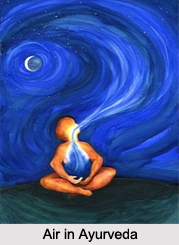 Vayu or air originates and gives direction to all motion and change and ultimately giving direction to all the processes and functions in nature"s creation. This principle of Vayu and motion governs the movement of everything of this universe right from the tiniest sub-atomic particles to the most immense and swirling galaxies. Ayurveda says that air actually gives direction to the wind. It can cause the earth to quake and volcanoes to spew fire. It is the Vayu that impels blood to flow through our veins, food to move through our intestinal tracts and neural impulses to be carried at lightning speeds to and from our brains.
Vayu or air originates and gives direction to all motion and change and ultimately giving direction to all the processes and functions in nature"s creation. This principle of Vayu and motion governs the movement of everything of this universe right from the tiniest sub-atomic particles to the most immense and swirling galaxies. Ayurveda says that air actually gives direction to the wind. It can cause the earth to quake and volcanoes to spew fire. It is the Vayu that impels blood to flow through our veins, food to move through our intestinal tracts and neural impulses to be carried at lightning speeds to and from our brains.
In Sanskrit, Vayu is "vaa" which means to "blow" or "to move". Vayu would be one of the first movements from the soul, which is often referred to as Prana. Within the soul, Vayu exists as unmanifested power or consciousness. Vayu manifesting as Prana is responsible for the manifestation of all creation.
Senses and Vayu in Ayurveda
Ayurveda defines that another important aspect of Vayu is that it can produce separation or disintegration as the movements also generates a drying influence. Sense of hearing is intimately associated with the principle of Akash; similarly the sense of touch arises out of the principle of the movement or Vayu. Skin is defined as the functioning organ of touch. It is capable of detecting movement in the form of gross or subtle changes in pressure, vibration or friction. Ayurveda specifies that movement against the skin can be registered as hard or soft, blunt or sharp, rough or smooth and fast or slow. All the information associated with movements is encoded in neural impulses and transmitted to the brain and that is in turn interpreted by the mind as something to be enjoyed or like something that can be avoided or either good or bad. Heart because of its constant pumping action is defined as a major organ of Vayu.
In Ayurveda, it is said that element of Akash governs such organs in the body which require some space to function and the Vayu governs those organs whose functioning requires some movement in the form of contraction. Muscular movements and the transmission of nervous impulses to and from the brain happen because of Vayu or air.




















